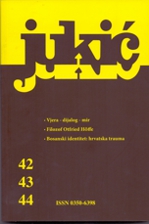Bosanski identitet: hrvatska trauma
Bosnian identity: Croatian trauma
Author(s): Dubravko LovrenovićSubject(s): Culture and social structure , Nationalism Studies, Transformation Period (1990 - 2010), Present Times (2010 - today), Inter-Ethnic Relations
Published by: Franjevačka teologija Sarajevo
Keywords: The Bosnian Croats; Croatian and Bosnian national identity; culture Thanatos; Europeanization; nominations and re-nominations;
Summary/Abstract: The extension of Croat national identity to a particular Balkan ethnic and confessional group, namely the Catholics of Bosnia and Herzegovina, caused a dichotomy between their cultural and political identities, which has followed this integral element in Bosnian and Herzegovinian history since the end of the 19th century. Accomplished in a symbiosis of the Romantic ideology of the Croatian Party of (Historic State’s) Right and political Catholicism, the Croat absorption of Bosnia and Herzegovina’s Catholics was imagined as being in the service of a future Croatian state. Construed thus, they remained, up until the international recognition of Croatia and of Bosnia and Herzegovina in 1991 and 1992, with the exception of the period of the Quisling Independent State of Croatia (1941- 1945), a nation without a state. With the disintegration of Yugoslavia and the birth of the new states, Bosnia and Herzegovina’s Croats found themselves in a new historical situation, between two possibilities: the mythic, thousand-year dream of Croatia as the “mother-land” and Bosnia and Herzegovina as an (un)wanted geopolitical reality. Consequently, this new political context of the state required a new national “text,” which is to say a harmonisation of cultural and political (state) identity. Experience both during and since the war (from 1991 to 2014) has shown that attempting to resolve the so-called “Croat Question” by promoting an exclusive relationship between ethnic labels and territory (ethno-territorialisation) has not succeeded in removing the existing dichotomy and has, indeed, served only to deepen it, while also alienating the Croats of Bosnia and Herzegovina from their primary living environment. Not withstanding that, there has been constant manipulation of ethnic and national identity in this direction, orchestrated by certain political parties, church leaders, and nationalist academic circles. The unavoidable question remains: are we to continue down this century-old path of the ethnic and religious integration of cultural and political identities or shall be attempt to re-imagine it in ways more in line with current circumstances? Concretely: is everything that has in the meanwhile been named Croat and been subject to extreme attempts, by manipulative methods, to keep it so, particularly with regard to history, language and literature, still to be referred to as such, or may it perhaps be (re)named as originally – Bosnian? Historical experience, allied to spiritual openness to and readiness for “the heresy of initiative,” suggests there is little choice as to which path to choose. It may, at any rate, offer a way of resisting the spirit of relativism inherent in neo-liberal capitalism. Everything in Bosnia and Herzegovina revolves around identity, and not just when we are dealing with the Croats of Bosnia and Herzegovina. Having changed names once, why not do so again, just in the opposite direction?
Journal: Jukić
- Issue Year: 2014
- Issue No: 42-44
- Page Range: 193-235
- Page Count: 43
- Language: Bosnian
- Content File-PDF

